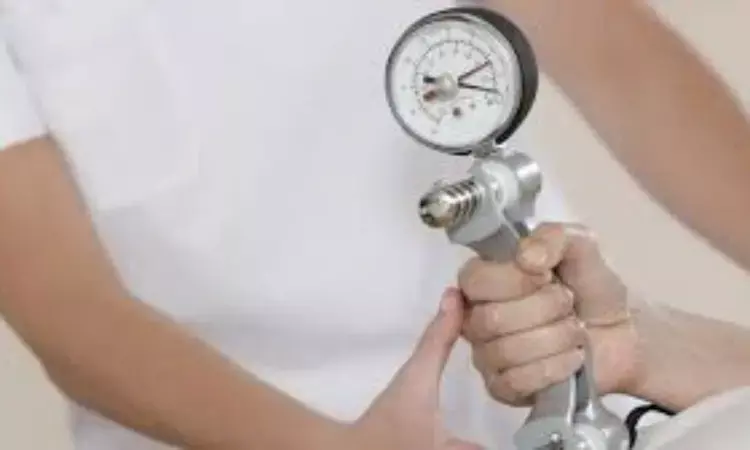- Home
- Medical news & Guidelines
- Anesthesiology
- Cardiology and CTVS
- Critical Care
- Dentistry
- Dermatology
- Diabetes and Endocrinology
- ENT
- Gastroenterology
- Medicine
- Nephrology
- Neurology
- Obstretics-Gynaecology
- Oncology
- Ophthalmology
- Orthopaedics
- Pediatrics-Neonatology
- Psychiatry
- Pulmonology
- Radiology
- Surgery
- Urology
- Laboratory Medicine
- Diet
- Nursing
- Paramedical
- Physiotherapy
- Health news
- Fact Check
- Bone Health Fact Check
- Brain Health Fact Check
- Cancer Related Fact Check
- Child Care Fact Check
- Dental and oral health fact check
- Diabetes and metabolic health fact check
- Diet and Nutrition Fact Check
- Eye and ENT Care Fact Check
- Fitness fact check
- Gut health fact check
- Heart health fact check
- Kidney health fact check
- Medical education fact check
- Men's health fact check
- Respiratory fact check
- Skin and hair care fact check
- Vaccine and Immunization fact check
- Women's health fact check
- AYUSH
- State News
- Andaman and Nicobar Islands
- Andhra Pradesh
- Arunachal Pradesh
- Assam
- Bihar
- Chandigarh
- Chattisgarh
- Dadra and Nagar Haveli
- Daman and Diu
- Delhi
- Goa
- Gujarat
- Haryana
- Himachal Pradesh
- Jammu & Kashmir
- Jharkhand
- Karnataka
- Kerala
- Ladakh
- Lakshadweep
- Madhya Pradesh
- Maharashtra
- Manipur
- Meghalaya
- Mizoram
- Nagaland
- Odisha
- Puducherry
- Punjab
- Rajasthan
- Sikkim
- Tamil Nadu
- Telangana
- Tripura
- Uttar Pradesh
- Uttrakhand
- West Bengal
- Medical Education
- Industry
Hand grip strength predicts shoulder function after rotator cuff repair, reports study

A recent study published in the Journal of Orthopaedic Surgery and Research highlights the role of a potential new indicator for postoperative success in rotator cuff tear repairs. The study analyzes the correlation between preoperative grip strength and postoperative shoulder function following arthroscopic rotator cuff repair (ARCR) where precise predictions can make all the difference in patient outcomes.
Rotator cuff tears (RCTs) are a widespread musculoskeletal issue that often necessitates surgical intervention for repair. ARCR is a common procedure for tendon repair which is frequently used in addressing this condition. The ability to accurately predict postoperative outcomes remains an ongoing challenge for orthopedic surgeons.
The study prospectively enrolled a total of 52 patients with full-thickness repairable RCTs to bridge this gap in knowledge. The baseline parameters like patient characteristics and intraoperative findings were meticulously analyzed along with postoperative shoulder functional outcomes. The Quick Disabilities of the Arm, Shoulder and Hand (QDASH) questionnaire and Constant–Murley scores (CMSs) served as the measures to evaluate shoulder function.
The study discovered a strong association between preoperative grip strength and postoperative shoulder function. The patients who expressed higher grip strength prior to surgery tended to experience more favorable outcomes following ARCR. This finding suggests that a simple preoperative grip strength test could serve as a valuable predictor for postoperative shoulder functional recovery.
The study identified other factors that influenced postoperative outcomes. The number of total suture anchors utilized during surgery inversely correlated with postoperative CMSs by indicating a potential impact of surgical technique on patient recovery. The higher body mass index (BMI) was associated with poorer postoperative QDASH scores during follow-up by highlighting the multifaceted nature of factors that influence surgical outcomes.
These findings suggest that implementing preoperative grip strength assessments as part of the standard evaluation process could provide valuable insights into expected postoperative recovery trajectories. Surgeons can tailor interventions and support strategies accordingly by identifying patients who may face challenges in their rehabilitation journey which could ultimately enhance the overall patient care and satisfaction.
The studies like this serve as important steps toward improving surgical outcomes and patient quality of life. Further research and clinical validation will help in making preoperative grip strength testing as a fundamental tool to offer personalized care and optimized results for individuals who undergo ARCR.
Source:
Liu, Y.-C., Huang, S.-W., Adams, C. R., Lin, C.-Y., Chen, Y.-P., Kuo, Y.-J., & Chuang, T.-Y. (2024). Preoperative handgrip strength can predict early postoperative shoulder function in patients undergoing arthroscopic rotator cuff repair. In Journal of Orthopaedic Surgery and Research (Vol. 19, Issue 1). Springer Science and Business Media LLC. https://doi.org/10.1186/s13018-024-04750-8
Neuroscience Masters graduate
Jacinthlyn Sylvia, a Neuroscience Master's graduate from Chennai has worked extensively in deciphering the neurobiology of cognition and motor control in aging. She also has spread-out exposure to Neurosurgery from her Bachelor’s. She is currently involved in active Neuro-Oncology research. She is an upcoming neuroscientist with a fiery passion for writing. Her news cover at Medical Dialogues feature recent discoveries and updates from the healthcare and biomedical research fields. She can be reached at editorial@medicaldialogues.in
Dr Kamal Kant Kohli-MBBS, DTCD- a chest specialist with more than 30 years of practice and a flair for writing clinical articles, Dr Kamal Kant Kohli joined Medical Dialogues as a Chief Editor of Medical News. Besides writing articles, as an editor, he proofreads and verifies all the medical content published on Medical Dialogues including those coming from journals, studies,medical conferences,guidelines etc. Email: drkohli@medicaldialogues.in. Contact no. 011-43720751


